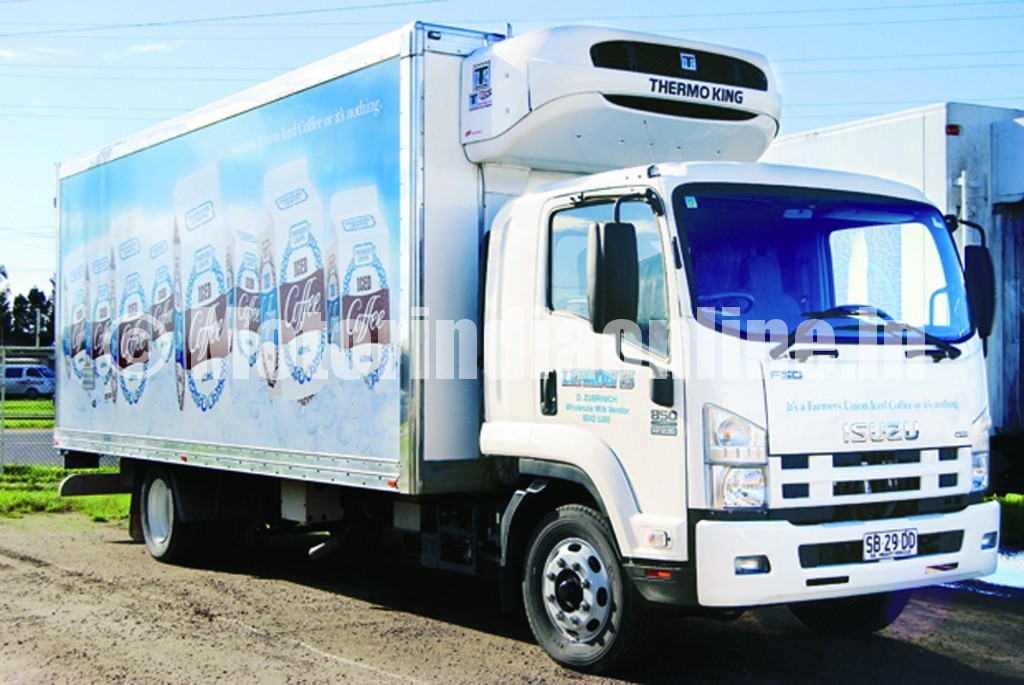Top Functions to Search For in Leading Refrigerated Truck Companies
Top Functions to Search For in Leading Refrigerated Truck Companies
Blog Article
A Detailed Overview of the Devices Behind Refrigerated Truck Transport and Its Function in Food Safety And Security
Cooled truck transport is vital in keeping food security, using sophisticated temperature control devices and insulation modern technologies to secure subject to spoiling goods throughout transportation. The integration of sophisticated tracking systems makes certain real-time oversight, allowing for prompt intervention in case of temperature variances. These crucial elements not only preserve the honesty of foodstuff but additionally play an essential role in stopping foodborne diseases. Nonetheless, comprehending just how these systems interact elevates crucial inquiries about their effectiveness and potential areas for improvement within the industry. What effects do these elements have for the future of food safety?
Relevance of Refrigerated Transportation
Refrigerated transportation plays a critical role in maintaining the integrity and safety and security of disposable products throughout the supply chain (refrigerated truck companies). This specific logistics system is crucial for maintaining the top quality of foodstuff, consisting of fresh produce, dairy products products, meats, and seafood, which are susceptible to spoilage when exposed to temperature changes. The capability to maintain a constant and regulated environment makes certain that these products retain their dietary worth, taste, and security for consumers
Furthermore, cooled transport minimizes the threats of foodborne health problems, which can occur from the development of hazardous germs in poorly kept items. By sticking to rigid temperature requirements, services not only adhere to regulatory requirements yet also foster customer depend on and brand dependability. The financial implications are substantial; decreased spoilage prices equate to lower losses for providers and retailers, contributing to overall profitability.
Moreover, the raising worldwide demand for fresh and high-quality foodstuff further stresses the relevance of refrigerated transportation. As supply chains become more intricate and extend worldwide, the demand for efficient temperature-controlled logistics remains to grow, underpinning the whole food circulation network and making sure that perishable items reach their destinations safely and successfully.
Temperature Control Mechanisms
Preserving optimum temperature control is vital in the transportation of disposable items, and a range of devices are utilized to achieve this goal. Chilled vehicles utilize sophisticated refrigeration systems, largely utilizing vapor compression technology, which distributes cooling agent via evaporator and condenser coils to draw out warm from the freight area. This procedure guarantees that the inside continues to be consistently great, thereby maintaining the top quality and safety of the products being delivered.
In addition, trucks are outfitted with temperature tracking systems that supply real-time information on the internal environment. These systems commonly include electronic sensing units and alarm systems to sharp drivers in instance of temperature fluctuations, enabling instant rehabilitative actions. Some refrigerated trucks also feature programmable temperature settings, enabling exact control customized to certain kinds of freight, such as drugs, fruits, or veggies.
Additionally, using pre-cooling strategies prior to filling improves the effectiveness of temperature level control. By decreasing the cargo area's temperature level before the intro of goods, the danger of temperature level spikes during transportation is reduced. These mechanisms jointly add to a trustworthy cool chain, crucial for keeping the honesty and safety and security of disposable food products throughout the transportation procedure.
Insulation Technologies
Insulation technologies play a vital function in boosting the performance of refrigerated vehicle transportation by decreasing thermal exchange between the cargo area and the external atmosphere. Effective insulation is crucial for maintaining the needed temperature level for subject to spoiling products, thereby ensuring food safety and quality throughout transit.
Typical insulation materials used in refrigerated trucks include polyurethane foam, polystyrene, and fiberglass, his explanation each providing differing degrees of thermal resistance. Polyurethane foam, understood for its exceptional protecting buildings, is often used as inflexible panels that can be built to fit the vehicle's inside. Polystyrene uses a lightweight option while still providing adequate thermal defense. Fiberglass, although much less usual, can be efficient in specific applications due to its resilience and resistance to moisture.

Advanced Tracking Systems
To make certain the stability of perishable products during transport, advanced tracking systems have actually emerged as an essential innovation in the refrigerated vehicle market - transport refrigeration company. These systems utilize a mix of sensing units, data loggers, and real-time monitoring innovations to continuously keep an eye on temperature, moisture, and general freight conditions throughout the trip. By offering instantaneous feedback on ecological variables, these systems enable punctual corrective actions, therefore securing item quality
Modern monitoring systems are furnished with cordless connectivity, allowing smooth data transmission to logistical hubs and stakeholders. This connection helps with remote tracking, which is essential for preserving conformity with sector regulations and standards. Alerts can be created in real-time, alerting operators of any type of variances from pre-set limits, hence minimizing the threat of putridity.
Moreover, the assimilation of innovative analytics and artificial intelligence algorithms boosts predictive capabilities, permitting much better from this source preparation and danger analysis. Historic data gathered from these systems can educate future transport strategies, optimizing courses and minimizing possible threats. On the whole, the deployment of advanced surveillance systems stands for a substantial advancement in the refrigerated transport sector, enhancing the dedication to maintaining the high quality and security of disposable products throughout their journey.
Impact on Food Safety Requirements
The assimilation of advanced monitoring systems in chilled vehicle transport has significantly affected food safety and security criteria throughout the supply chain. These systems enable real-time tracking of temperature level, humidity, and other critical criteria crucial for preserving the integrity of subject to spoiling items. By guaranteeing that products continue to be within defined temperature level varieties during transportation, these technologies minimize the danger of microbial growth and spoilage, which are crucial in food security.

The fostering of data analytics likewise permits proactive decision-making, making it possible for business to identify prospective issues prior to they intensify into food safety and security infractions. Therefore, the unification of advanced surveillance systems not only boosts functional effectiveness but likewise fosters greater liability in the food supply chain. This evolution underscores the essential role of modern technology in elevating food security standards and making certain consumer confidence in the items they get.
Conclusion
In verdict, refrigerated vehicle transport is necessary for maintaining food security click to investigate via effective temperature control, progressed insulation modern technologies, and continuous tracking systems. These devices function synergistically to preserve the high quality of subject to spoiling goods and lower the risk of foodborne health problems. Adherence to rigorous food safety standards is accomplished with the execution of these technologies, highlighting the important duty of refrigerated transport in the food supply chain and its impact on public health.
Cooled truck transport is vital in keeping food security, employing sophisticated temperature control mechanisms and insulation technologies to guard subject to spoiling items throughout transportation - refrigerated truck companies. Proper maintenance of insulation stability, consisting of routine checks for wear or damage, is also important to suffer the efficiency of chilled transportation systems and make sure compliance with food security policies
The integration of advanced surveillance systems in refrigerated vehicle transport has significantly affected food safety and security requirements across the supply chain.In conclusion, chilled truck transportation is essential for preserving food safety and security with reliable temperature level control, advanced insulation technologies, and constant surveillance systems. Adherence to strict food security requirements is accomplished via the execution of these innovations, highlighting the crucial role of refrigerated transport in the food supply chain and its effect on public health.
Report this page